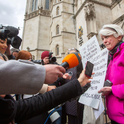One thing needs to be declared immediately: nothing in this post is based on insider information. The author of what you are reading has no idea whether the various allegations about political gambling that are dominating the headlines are true or not, and it is likely that you do not either. Everything in this post is instead based on information in the public domain, available to anyone who wants to find it.
The question for this post is simple: in general terms, can political gambling be a criminal offence? The answer to this is not straightforward.
There is no specific offence of political gambling—and indeed it would seem that political gambling is a good market for bookmaking firms, else that market would not exist. One can reasonably infer from the existence of political betting markets that a sizeable number of those betting on political events have no reliable inside knowledge, as no gambling firm would offer bets which they would be bound to pay out on, as opposed to making a profit.
And contrary to some news reports, there is no specific offence for gambling that uses (or misuses) confidential information. What does exist is an offence for “cheating” under section 42 of the Gambling Act 2005. This provides that it is a criminal offence if a person cheats at gambling. It does not matter for this offence if that person loses. It does not even matter if that person does not even improve their chances of winning. It only matters if they have cheated, regardless of whether they have prospered in doing so.
So what is “cheating”? The Act does not tell us. The term is not defined. It is what judges would regard as a jury (or magistrate) question—a matter for the court to decide on the merits of an individual case. “Cheating” is an everyday word which should have an everyday application to a particular instance.
Cheating, however, does not at law require an element of dishonesty. Of course, cheating often includes dishonesty, but it is possible to cheat without being deceitful. In a fascinating—and readable—2017 case, the Supreme Court observed that a prosecution does not need to show there has been a lack of honesty for a person to be a cheat under the Gambling Act.
In that case Lord Hughes said: “The runner who trips up one of his opponents is unquestionably cheating, but it is doubtful that such misbehaviour would ordinarily attract the epithet ‘dishonest’. The stable lad who starves the favourite of water for a day and then gives him two buckets of water to drink just before the race, so that he is much slower than normal, is also cheating, but there is no deception unless one manufactures an altogether artificial representation to the world at large that the horse has been prepared to run at his fastest, and by themselves it is by no means clear that these actions would be termed dishonesty.”
So what about (mis)using insider information? Would that be cheating? Ultimately, it would be for a jury or a magistrate to decide, but it is not certain what the prosecution would need to show for the use of any information to be cheating, as opposed to being able to show an act of deceit or an intervention in a contest in some way.
There is an offence of “insider dealing” for those insiders who deal in securities with inside information. This is under section 52 of the Criminal Justice Act 1993. That Act also defines “insider” and “inside information”. But this statutory scheme is not carried over to the Gambling Act. Indeed, the Gambling Act is silent on the misuse of inside information. This raises the question of why there needs to be a detailed definition of insider trading in respect of securities trading, but not one for gambling. Would a gambling prosecution have to make out the same elements of the offence?
Nonetheless, despite this statutory silence, the Gambling Commission confidently holds the view that misuse of inside information can be caught by the section 42 offence. A Commission spokesperson has recently been reported as saying that if someone uses confidential information in order to gain an unfair advantage when betting then this may constitute an offence of cheating.
The Commission has taken time in developing this view. In 2018 it published a considered policy position paper on the misuse of inside information in gambling. The document, primarily aimed at betting in sporting events, considers the role of sporting authorities in keeping their own sports in good order. But the content of the note seems relevant to the current allegations.
In essence, the Commission’s policy view is that using information that is the product of research or even overheard in a public place would not be a misuse of that information. But using information that is restricted or is only known because of a position or close relationship could be a misuse.
The most serious situation would be when “an individual has manipulated the event or part of the event”—that decision-maker has made a bet on their own decision. That is not the case here. (Though, of course, such is the haplessness of the current prime minister that if he himself had placed a bet on the date of the general election he probably would have lost.)
But it would also be a serious situation where those “individuals who are aware of this [information] use that information to place bets”. That would appear to be the sting of the current allegations, which cover those at least one or two removes away from the decisions on which they are betting.
But the problem in practice for any such prosecution would be evidencing that a particular bet was placed on the basis of private information, rather than on the basis of general knowledge or intuition. Absent an admission or unambiguous documentary evidence, that may be difficult to prove beyond reasonable doubt, which is the threshold for a conviction. It may even be difficult for the Commission to show that a prosecution has a reasonable prospect of success, which is the lower threshold for bringing a case. Here it must be noted that the Commission’s paper is a statement of policy and not law; the scope of the offence is a matter for the courts and not the Commission.
These practical difficulties in bringing about any prosecution under the “cheating” offence possibly explains why those caught up in this controversy who are public servants, such as police officers, are facing investigation not from the Gambling Commission under the “cheating” offence but from the Metropolitan Police for the more elastic (and far easier to prosecute) offence of misconduct in public office. It may be that those others holding forms of public office, elected or otherwise, also face investigation under that offence rather than the “cheating” offence.
As for those facing investigation by the Gambling Commission for the section 42 offence, they are now in the situation where it is not absolutely certain whether the alleged misuse of confidential information constitutes cheating as a matter of criminal law. And, if so, whether the Commission can put together any case with a realistic prospect of success.
Maybe such prosecutions will be possible, but they themselves will be a bit of a gamble to bring and maybe prosecutions may not be brought. So, to adapt the words of the eminent jurist Harry Callahan, the punters caught up in this scandal may need to ask themselves one question: do you feel lucky?













